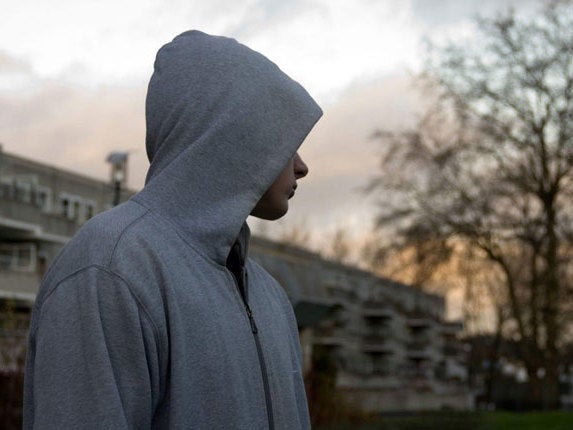'Hoodies, louts, scum': how media demonises teenagers
Research finds negative stories in the press make teenage boys frightened of each other

The portrayal of teenage boys as "yobs" in the media has made the boys wary of other teenagers, according to new research.
Figures show more than half of the stories about teenage boys in national and regional newspapers in the past year (4,374 out of 8,629) were about crime. The word most commonly used to describe them was "yobs" (591 times), followed by "thugs" (254 times), "sick" (119 times) and "feral" (96 times).
Other terms often used included "hoodie", "louts", "heartless", "evil" "frightening", "scum", "monsters", "inhuman" and "threatening".
The research – commissioned by Women in Journalism – showed the best chance a teenager had of receiving sympathetic coverage was if they died.
"We found some news coverage where teen boys were described in glowing terms – 'model student', 'angel', 'altar boy' or 'every mother's perfect son'," the research concluded, "but sadly these were reserved for teenage boys who met a violent and untimely death."
At the same time a survey of nearly 1,000 teenage boys found 85 per cent believed newspapers portray them in a bad light.
They felt reality TV – with shows like The X Factor and Britain's Got Talent – portrayed them in a better light – with fewer than 20 per cent believing they were being portrayed negatively.
As a result of the negative press, 80 per cent felt adults were more wary of them now than they had been a year ago. However, the most striking finding, according to the research, was that many were now more wary of boys of their own age. "It seems the endless diet of media reports about 'yobs' and 'feral' youths is making them fearful of other teens," it said. "Nearly a third said they are 'always' or 'often' wary of teenage boys they don't know.
"The most popular reason for their wariness, cited by 51 per cent was 'media stories about teen boys' compared with 40 per cent who said their wariness was based on their own or friends' bad experiences of other teens."
Nearly three-quarters said they had changed their behaviour as a result of this wariness. The most common change, cited by 45.7 per cent, was boys avoiding places where teenagers hung around. Others included dressing differently (14.2 per cent), and changing who they were seen with (11.9 per cent). "For much of the press, there is no such thing as a good news story about teenagers," it added.
"Stories about sport and entertainment, which might have balanced other negative coverage, also took a critical line. Only 16 per cent of stories about teens and entertainment were positive: only 24 per cent about teens and sport were positive."
The research found that – for all the coverage of teenage issues – the boys' voices themselves were rarely heard in newspapers. Fewer than one in 10 articles about young people actually quoted young people or included their perspectives in the debate.
Fiona Bawden, the WiJ committee member who presented the research at the British Library, said: "When a photo of a group of perfectly ordinary lads standing around wearing hooded tops has become visual shorthand for urban menace, or even the breakdown of society, it's clear teenage boys have a serious image problem.
"The teen boys' 'brand' has become toxic. Media coverage of boys is unrelentingly negative, focusing almost entirely on them as victims or perpetrators of crime – and our research shows that the media is helping make teenage boys fearful of each other."
The research, Hoodies or Altar Boys? what is media stereotyping doing to our British boys? was carried out for WiJ by the research company, Echo.
Join our commenting forum
Join thought-provoking conversations, follow other Independent readers and see their replies
Comments
Bookmark popover
Removed from bookmarks